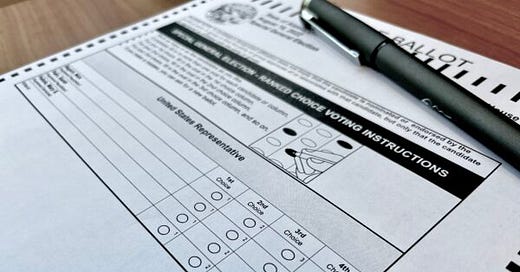Montanans should be wary of open primaries
Take it from an Alaskan: ranked-choice voting makes polarization worse, not better
This November, Montana voters may be asked to consider two constitutional initiatives that would fundamentally change how Montana’s elections work.
Take it from an Alaskan: These so-called “reforms” will not produce more choice or reduce polarization and divisiveness. Instead, they will confuse and disenfranchise voters, undermine moderate candidates, and play into the hands of out-of-state special interests seeking to manipulate Montana elections.
Constitutional Initiative 126 would institute top-four open primaries, meaning all voters would receive the same primary ballot. Regardless of party, the four candidates with the most votes would move on to the general election. Constitutional initiative 127 would require a candidate to receive at least 50% of the vote to be declared the winner.
If no candidate receives 50% of the vote, the initiative leaves it up to the legislature to decide how to resolve it. One option would be to institute ranked-choice voting. Another option is to follow the example of states like Georgia, Louisiana, and Mississippi by instituting runoff elections. These are sometimes criticized for their expense and low turnout, arguments typically used to support the idea of switching to ranked-choice voting.
Sound familiar? It should. In 2020, Alaska voters passed Ballot Measure 2, which instituted a top-four primary and ranked-choice voting in one fell swoop. The measure first went into action for Alaska’s contentious special election to fill the late Don Young’s seat in the U.S. House. The primary ballot had a whopping 48 candidates on it, where three advanced to the special general election (the fourth-place candidate dropped out, and the fifth-place candidate was not allowed to advance due to procedural reasons).
When the tabulation wrapped up, the Democratic candidate (Mary Peltola) won, despite Republican candidates (Sarah Palin and Nick Begich) amassing 60% of first-choice votes. If that result doesn’t feel intuitive, that’s because it isn’t. In a head-to-head contest with either Ms. Palin or Ms. Peltola, Mr. Begich would have won. And according to a working paper using a representative sample of 50,000 voters, in every state the method “can broadly be expected to deliver results that deviate away from representative candidates and instead award victories to more extreme candidates.”
Translation: ranked-choice voting makes polarization worse, not better.
That may be intentional. The constitutional initiatives are backed by Montanans for Election Reform, an innocuous-sounding group that is opposed to “big money special interests” influencing Montana’s elections. As are most people, which is why it is disturbing that Montanans for Election Reform is funded almost entirely by out-of-state interests. Unite America PAC and Article IV each donated $500,000 in the first quarter of 2024. The organization also received $100,000 from the Sixteen Thirty Fund.
Unfortunately, it’s a nationwide pattern: An organization springs to life just in time to fund a ballot initiative with out-of-state dollars, then withers after its work is done. Alaskans for Better Elections, which sponsored the 2020 ballot measure that brought ranked-choice voting to Alaska, received $3.4 million from Unite America and Unite America Reform Fund. Nevada Voters First, which succeeded in its first ranked-choice ballot initiative that will be voted upon again in November, received $7.9 million from Unite America.
It’s telling that these progressive dark-money groups aren’t selecting California, Massachusetts, or New York to be ranked-choice guinea pigs. Alaska, Nevada, and Montana are cheap dates: states where a little money can go a long way towards splitting the vote and undermining small-government, moderate candidates.
Supporters of CI-126 and CI-127 will try to create a glowing paradise of voter choice and civil politics. Who wouldn’t want to buy what they’re selling? But Montanans would be wise to ask any Alaskan if elections have truly become any less divisive, or politics any less polarizing, since ranked-choice voting was instituted.
This piece was originally published at the Helena Independent Record and the Ravalli Republic on June 1, 2024.



